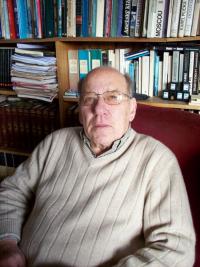Look, comrade, you’ll be in charge of the children’s home

Download image
Ilios Yannakakis is a French historian of Greek origin. He was born in Egypt in 1931, to a Greek father and a Russian mother. After the death of both his parents he joined the Greek communist movement. He set out from Egypt to Greece via Western Europe, with a stop in Prague. There he stayed from 1949 until the arrival of the Soviet troops in 1968 when he emigrated to France, where he lives until today. During his life in Czechoslovakia he worked in several children’s homes (Velký Radošov, Zlaté Hory), he then moved to Ostrava where he worked as an educator in the military reserves. He studied and then was also involved in teaching at Palacký University in Olomouc, before moving to Prague. He was in touch with the representatives of the Czech dissent - Havel, Dienstbier, Tigrid. After emigrating to France, he became a professor of history at the University of Lille. He witnessed the Velvet Revolution in Prague.
